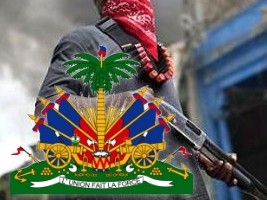|
||||||||||||||||||
|
|
Haiti - Politic : The political role of gangs in Haiti 04/06/2019 11:36:10
Recall that the analyzes published in this report come from data collected from representatives and leaders of more than 600 organized groups of the Nation Extracts from the Report Sectoral General Conditions of the Nation (1.1.1) : "[...] A zero sum game is a game where the gain of one is a loss for the other. It is this image that imposes itself on political actors in Haiti : politics is a zero-sum game, with a winner and a loser. The determining element of victory is not the quality of the political offer, the talent and ingenuity, but the strength; a lesson learned from the experience of what has been going on in the electoral struggle in Haiti since the adoption of the Constitution in 1987. Only candidates who have the force of violence (armed group), money, and networks are able to win the elections. So, you have to be in the strongest position. Hence a quest for power that leads to a form of political criminalization. The politician seeks support from sectors that practice violence, in exchange for protection. Participants establish link between the proliferation of gangs in difficult neighborhoods with this political strategy. [...] The marginal or alternative authorities multiply in so-called sensitive neighborhoods, and ransom the population for days. In these neighborhoods, it is these armed individuals who organize the life of the population, who collect taxes for public services such as water and electricity [...] [...] The need for gang support in the political battle where there must necessarily be a winner is the basis of the insecurity that has become widespread in recent years. The representative of an organization based in Pont-Rouge points out that young people from poor neighborhoods have no other alternative that to take up arms. He wonders "How can the State help the poor neighborhoods get out of the clutches of bandits ? How is it going to save young people who have not yet taken up arms ? It is necessary that the State cease to frame the armed men, it is necessary to frame preferably the members of the organizations, to create professional schools, artistic schools, sports centers." Another organizer at Village Democratie, Fort Dimanche, describes a dark picture of the situation of the inhabitants of its neighborhood "The inhabitants do not feel safe, we do not receive any visit from the authorities. No latrine, we do not live like human beings. One is born unemployed, one feels excluded" adding that "the only vocational school is the handling of firearms." For the traditional politician, gangs provide support that often tilts the balance of power to his advantage. On the occasion of the elections, these groups make it possible to intimidate the adversary candidates to vandalise the offices where they have a significant lead, to pull the vote of "ignorant" voters, etc... This violence is added to the others practices that make it possible to win elections or to seize power outside the legitimate rules. These include buying votes, bribing polling station officials or election advisers. Me Julien see in these practices the base of the collapse of the country "The true persons responsible for the decline of Haiti are ourselves. We ourselves leaders, for having accepted our access to a power acquired outside a real citizen structure and have done nothing to correct this anomaly; We ourselves voters, for not having the healthy freedom of our choice during the elections and despite this handicap, in the 21st century we continue to vote again unlike our neighbors for our misfortune.. These practices mean the negation of the Constitution, democratic institutions, fundamental rights and freedoms of individuals, of interests of the State, sovereignty belonging to all citizens. Negation that leads to the chaos of competing political claims : each one overestimates his ability to lead the country, and denies to others this claim [...] which is characterized by a fundamental conflict between the rules of the political game enshrined in the 1987 Constitution and the traditional rules emanating from the experiences of period bayonet violence, generation after generation; the first are repressed in favor of the seconds. Since independence, the country has been locked in a spiral of political instability made up of splits in several States : civil wars, insurrections, coups and dictatorships [...]" Download the full report (PDF in French) : https://www.haitilibre.com/docs/EGSN-RAPPORT-15-Avril-19-Gouvernance-politique-economique-socioculturelle.pdf HL/ HaitiLibre
|
|
|
Why HaitiLibre ? |
Contact us |
Français
Copyright © 2010 - 2024 Haitilibre.com |



